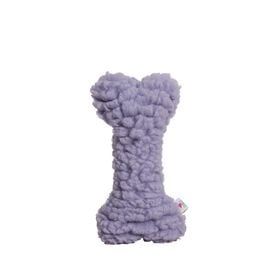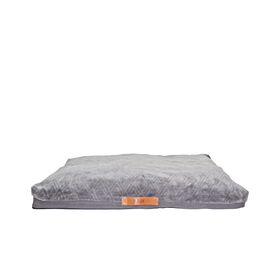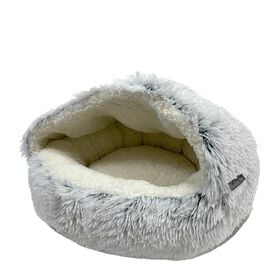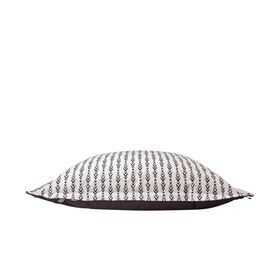Contents
Your dog's sleep is more than just a time of inactivity; it is a crucial aspect that directly affects their overall health and daily behaviour. It's not only about snoring and waggling paws but also about getting the right amount of sleep. Adequate sleep plays a fundamental role in your dog's quality of life and, ultimately, yours too! Therefore, it is essential to understand their sleeping habits to ensure your pet's good health.

Phases of sleep in dogs
Dogs experience two main sleep phases, similar to humans: rapid eye movement (REM) and slow-wave sleep (non-REM).
Slow-wave sleep (non-REM)
This phase marks the transition from wakefulness to sleep. The dog relaxes, breathing becomes regular, and muscle movements decrease, leading to a deep and restorative sleep.
Rapid eye movement (REM) sleep
While in REM sleep, dogs may show signs of dreaming, such as rapid eye movements, irregular breathing, and increased brain activity.
Dogs have a shorter sleep cycle than humans. They can switch quickly from slow-wave to REM sleep and experience multiple complete sleep cycles per night.
Do dogs dream?
The answer to this intriguing question can be found in the similarities between the sleep patterns of dogs and humans. Dogs go through different sleep phases, which include light sleep, deep sleep, and the REM (Rapid Eye Movement) sleep phase, also known as the dreaming phase. During the REM phase, dogs may show behavioural signs related to dreaming. Studies have revealed that dogs can experience emotions during sleep, suggesting they may have dreams similar to humans. However, whether dogs dream in colour, imagine smells, or even stories still needs to be determined.

How many hours of sleep does a dog need?
The amount of sleep dogs require depends on age and fitness. Puppies and older dogs generally need more rest, while fit adult dogs can benefit from 12 to 14 hours of sleep daily.
Factors influencing sleep needs
- Age: young puppies require up to 18-20 hours of sleep daily, which decreases as they grow older. Older dogs may also need more sleep due to health factors.
- Breed: some dog breeds have specific sleep needs. Working dogs may require more rest to recover from physical activities.
- Activity level: active dogs, especially those involved in sports, may require more rest to recover.
- Health condition: health problems can affect the amount of sleep dogs need. Dogs who are sick or recovering may require more rest to aid in their healing process.
Also read: What emotions can dogs feel?
Signs of sleep disorders in dogs
Paying attention to your dog's sleep quality is essential as it can be a critical indicator of their overall health. Be mindful of any signs of sleep disorders such as insomnia (lack of sleep) or hypersomnia (excessive sleep) by carefully observing your pet's behaviour.
Insomnia is more common in dogs that display signs of anxiety, which can cause the animal to be alert for extended periods, leading to reduced rest. On the other hand, hypersomnia may be observed in older dogs experiencing cognitive decline, resulting in confusion and longer sleep periods. It can also occur in a dog going through a mourning period or depression.

Signs to watch for:
- Excessive restlessness: uncontrolled movements or frequent tremors during sleep may indicate sleep disorders.
- Frequent awakenings: if your dog wakes up frequently at night, it may indicate a sleep issue.
- Changes in sleep patterns: any significant changes deserve special attention.
- Whining or crying: vocalizations during sleep may indicate stressful dreams, nightmares or pain.
If you notice persistent signs of sleep disorders, consult your veterinarian, as it may be related to underlying health issues such as pain, anxiety, or other medical conditions.
Do not wake a sleeping dog
Sleep is essential for your dog's health and well-being. It's important not to disturb it without a valid reason, as it can affect their physical and mental state.
- Rest consolidation: waking them can interrupt the process of physical and mental recovery.
- Emotional stability: it's essential to ensure your dog gets uninterrupted sleep, as it helps them maintain emotional balance and avoid stress and anxiety.
- Preventing undesirable behaviour: a dog awakened suddenly may express displeasure through unwanted behaviour.
- Reduced risk of stress: getting enough sleep is crucial for dogs to manage their stress levels effectively.
Tips to respect your dog's sleep:
- Create a quiet environment: it's important to avoid loud noises and create a peaceful sleeping space for your dog to ensure they get proper rest.
- Educate family members: it is important to teach all family members, especially children, about not disturbing a sleeping dog.
- Establish regular schedules: create a stable sleep routine by following regular schedules.
Creating a sleep-friendly environment for your dog
Your dog's sleep quality is heavily impacted by its environment, and providing a comfortable and quiet resting space can significantly improve your pet's overall well-being.
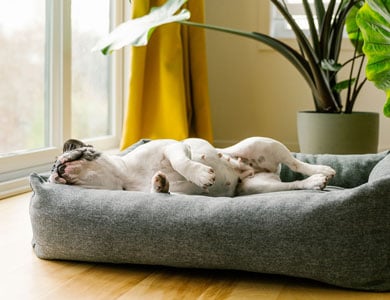
Here are some practical tips to help your dog sleep better:
- Choose a calm and secure location for your dog's cushion.
- Minimize excessive light sources during the night to avoid disturbances.
- Ensure the room temperature is comfortable for your dog.
- Choose plush toys to help your dog relax.
- Integrate a familiar blanket or mat into the sleeping space.
- Create a soothing pre-sleep routine for your dog before bedtime.
Ensuring that you understand your dog's needs and make necessary adjustments in their environment can help promote peaceful and restful sleep for your furry friend.
Choosing the right cushion for your dog
A good cushion contributes to comfort and is crucial to your dog's health. When choosing a bed for your dog, there are several essential things to consider.
What to look for:
- Size and shape: it is important to choose a bed that is appropriate for the size of your dog. It will ensure they have enough space to stretch out and sleep comfortably.
- Materials: dogs may have preferences for specific materials. Some dogs prefer soft fabrics like velvet, while others prefer cooler surfaces.
- Support level: ensure your dog's bed provides proper support. Memory foam conforms to your pet's body, reducing pressure on joints and promoting comfortable sleep, ideal for senior or joint-problem dogs.
- Ease of cleaning: opt for a bed with a removable and machine-washable cover.
Also read: 6 prevalent health problems in older cats and dogs
Tips for choosing the right cushion for your dog
- Pay attention to your dog's preferences: consider their sleeping habits. A larger cushion may be necessary if they like to spread out, while dogs who like to feel enveloped will appreciate a bed with raised edges.
- Considering health conditions: if your dog has specific health problems, it's best to consult your veterinarian for advice on the most suitable bed type.
- Where to place the cushion: put the bed in a quiet, safe place, ideally away from draughts and loud noises.
By ensuring your dog has a comfortable and safe place to sleep, you can contribute to their overall well-being.
Benefits of adequate sleep
Ensuring that your dog gets quality sleep is essential not only for their comfort but also for their overall health and behaviour. Knowing the benefits of proper sleep will help you understand the significance of a good night's sleep for your beloved pet.

- Physical recovery: deep sleep helps your dog to recover physically.
- Memory and learning: adequate sleep promotes better memorization of commands and learning.
- Emotional balance: regular sleep contributes to maintaining emotional balance, reducing the risk of stress and anxiety.
- Support for immune health: sleep strengthens the immune system, helping fight infections.
- Reduced risk of behavioural disorders: uninterrupted sleep reduces the risk of unwanted behaviours.
- Longevity and quality of life: healthy sleep habits are linked to a longer life and better quality of life.
Getting enough sleep is essential for your dog's health and behaviour. Understanding their specific sleep needs and creating a comfortable environment is vital for maintaining emotional balance, preventing health issues, and ensuring a long and fulfilling life for your furry friend.
This article was reviewed by Dr. Valérie Trudel, veterinarian and member of CABEA Mondou.





